Jeb Bush, Hillary Clinton dominate early 2016 presidential fundraising
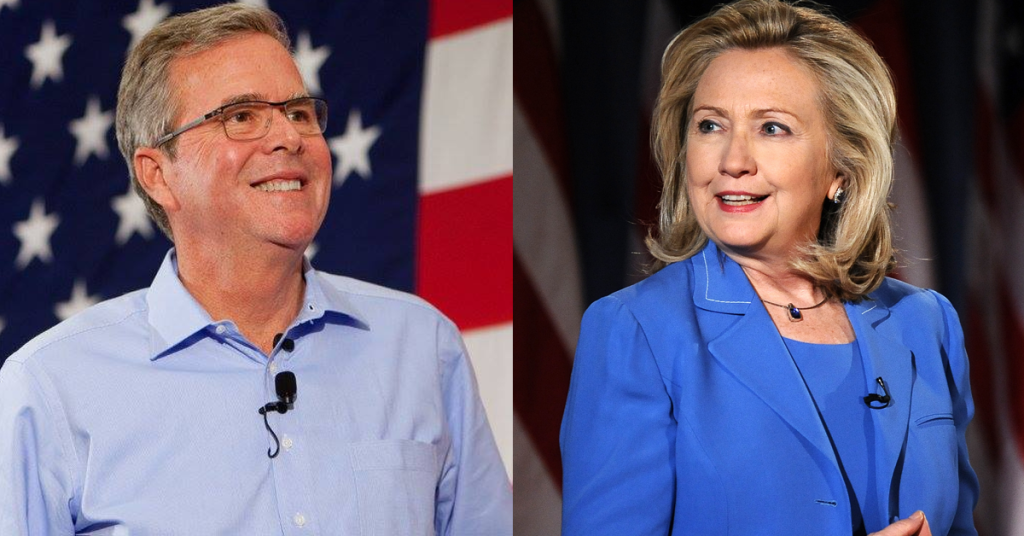
The two presidential candidates whose immediate families include former presidents loom large in early fundraising for 2016. Democrat Hillary Rodham Clinton and Republican Jeb Bush are building mammoth political operations to power them through the primary contests next year. Their financial backers have poured more than $176 million into their campaigns and the super PACs specially designed to boost them. Wednesday provided the first peek behind the fundraising curtains of most presidential candidates, with campaigns filing initial fundraising reports to federal regulators. Super PACs will file similar documents at the end of this month. The new reports show that Clinton’s campaign is spending money at a rapid clip: The former first lady and front-runner in the Democratic race has paid out 40 percent of the $47 million in donations that she amassed by the end of June, employing 364 people and building infrastructure across the country in preparation for next year’s general election. Bush, the former Florida governor and son and brother of ex-presidents, spent more than one-quarter of the $11.4 million in fundraising that he collected in the final 16 days of June, according to the reports. The campaign invested heavily in payroll and policy consulting. Wednesday’s Federal Election Commission reports cover financial activity between April 1 and June 30, a period when almost all of the 22 presidential hopefuls jumped into the race, and list the names of everyone who gave at least $200. The maximum contribution for the primary is $2,700. The FEC documents also showed how candidates are spending – or saving: In the crowded Republican field, Florida Sen. Marco Rubio started July with almost $10 million, just ahead of Bush and Texas Sen. Ted Cruz, and in front of the rest of the GOP pack. Yet a candidate’s own campaign is just one page in the money story. Super PACs can accept contributions of any size. They’re limited on how closely they can work with the campaigns but are often staffed with close confidants of the candidates. In many cases, the candidates themselves have “blessed” the super PACs and pitched in with their fundraising. These and other powerful outside groups account for about two-thirds of the about $400 million raised so far for the presidential election, according to an Associated Press tally of FEC documents and financial totals provided by the groups that haven’t yet reported. No current candidate has made as much use of super PACs and their unlimited-donation potential as Bush. Before he officially declared his candidacy, he spent the first six months of the year raising huge sums of money for Right to Rise. That group says it has raised a record $103 million. Outside groups are furthering the ambitions of at least four other Republican presidential aspirants: Rubio, Cruz, Texas Gov. Rick Perry and Ohio Gov. John Kasich. In each case, the fundraising for those entities is outpacing the fundraising for their campaigns. Rubio’s overall take from donors — $44.7 million to his campaign and two outside groups — includes $15.8 million for a nonprofit that won’t file any public budget information until at least next year and keeps its donors secret. Some donors are secret for another reason: They’re too small. The FEC only requires names and identifying information for people who give more than $200. These kinds of contributors are underwriting Vermont Sen. Bernie Sanders‘ Democratic presidential campaign, FEC reports show, accounting for more than three-quarters of the $13.7 million in contributions he collected. Sanders also transferred $1.5 million from his dormant Senate campaign account. Also doing well on the small-donor front is Republican retired neurosurgeon Ben Carson. About 68 percent of his $10.6 million raised this year was in contributions of $200 or less. Carly Fiorina, a California technology executive also seeking the GOP nomination, raised 43 percent of her $1.7 million this way. Because the money is coming directly to those candidates, they have tighter control over how it is used. By comparison, 3 percent of Bush’s campaign cash and 17 percent of Clinton’s came from small donors. A few major Republican candidates are missing from the initial campaign finance reports. Kasich hasn’t officially launched his campaign yet. Wisconsin Gov. Scott Walker and New Jersey Gov. Chris Christie made their campaigns official too recently to file second-quarter FEC reports, although a Christie-allied super PAC said on Tuesday that it has raised $11 million. The first look at their campaign numbers will come in mid-October. Republished with permission of The Associated Press.
Ted Cruz’s 2016 campaign says its raised more than $14M
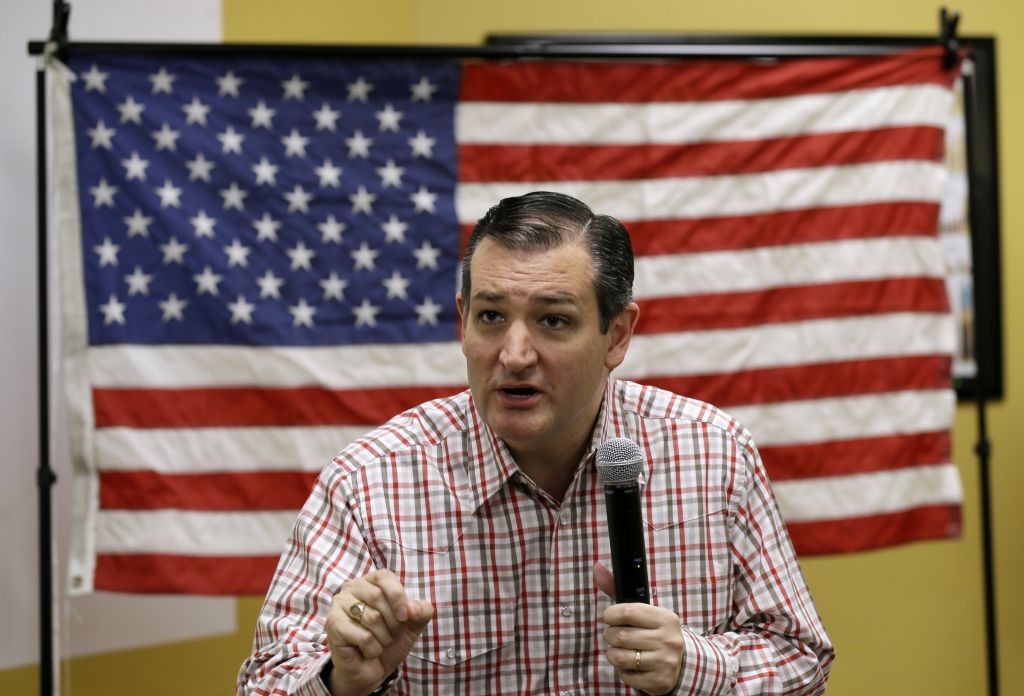
Ted Cruz‘s presidential campaign has raised more than $14 million since the Texas senator launched his bid for the Republican presidential nomination just over three months ago, his campaign said Sunday. The money comes from more than 120,000 donors who made an average contribution of $81. Presidential candidates are required to report detailed fundraising figures though the end of June to the Federal Election Commission by mid-July, but Cruz is among a handful of contenders who have announced overall totals ahead of the disclosure date. Republican Ben Carson, a retired neurosurgeon and political novice, will report having raised $8.3 million for his presidential candidacy, his campaign said on Wednesday. On the Democratic side, front runner Hillary Rodham Clinton will report having raised $45 million. Cruz was the first major Republican to wade into the GOP primary, which will soon have 16 formally declared candidates. After his March 23 announcement at Liberty University in Virginia, his campaign raised just over $4 million in the final week of that month. Since then, he’s collected another $10 million, his campaign said. Cruz also transferred $250,000 from his Senate campaign to his presidential campaign, according to documents filed with the FEC. “The grassroots energy and support we are seeing is overwhelming,” Cruz said in a statement. Cruz also will benefit from several super PACs that are supporting him and can raise money without contribution limits. Those groups have previously said they have raised $37 million. Presidential campaigns must report their fundraising details to federal regulators by July 15. Outside groups such as super PACs have a later deadline. Republished with permission of The Associated Press.
Wisconsin Gov. Scott Walker entering 2016 presidential race
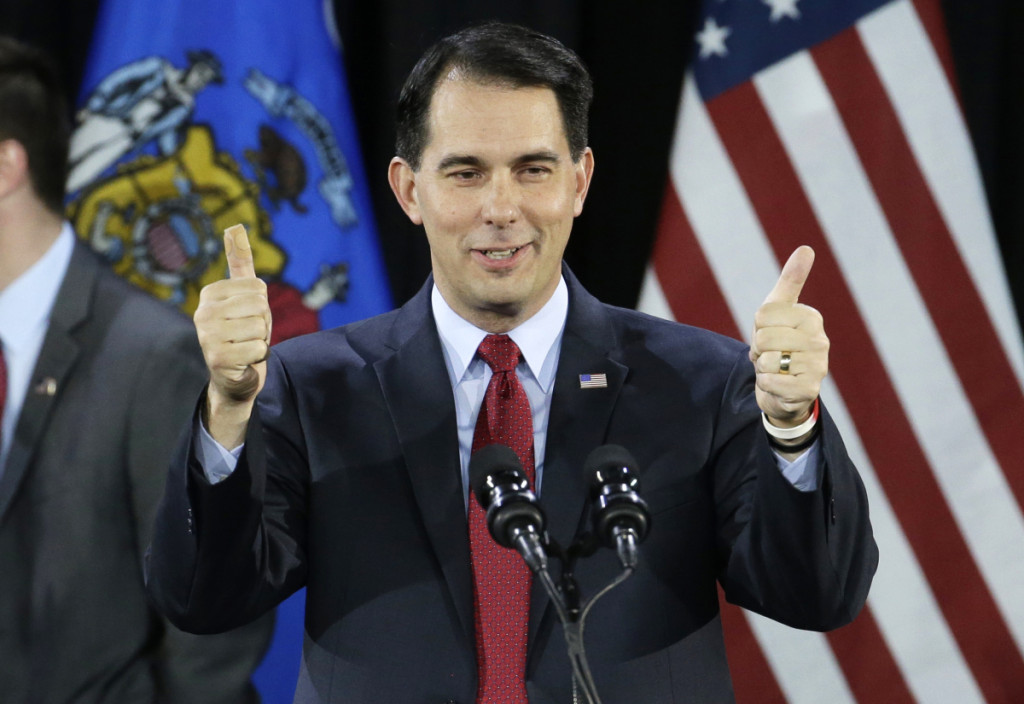
Wisconsin Gov. Scott Walker, a preacher’s son who withstood a recall election spawned by his fight with public employee unions, is joining the crowded Republican presidential race, aides said. The 47-year-old Walker planned to file the paperwork for his long expected candidacy with the Federal Election Commission on Thursday, and kick off the 2016 campaign in the Milwaukee suburb of Waukesha on July 13, the aides said. They spoke on condition of anonymity because they weren’t authorized to publicly discuss the launch ahead of the filing. The governor has traveled throughout the country in the past several months, speaking to conservatives, courting voters and scoring well in some early polls. The jumbled race already had attracted 14 candidates before Walker’s entry. Earlier this week, New Jersey Gov. Chris Christie announced his candidacy. He rose to national prominence soon after his election as governor by pushing for a law in 2011 that effectively ended collective bargaining for most public workers in the state. Four years later, he pressed to make Wisconsin a right-to-work state where employers and unions are barred from requiring all workers to pay union dues. In 2011, protests at the Statehouse grew as large as 100,000 people at times, and Democrats in the state Senate fled Wisconsin for three weeks hoping to undermine Walker’s efforts. Walker’s victories over organized labor certified him as a rising Republican star. It also made him a top target for Democrats and union leaders, who tried to recall Walker in a special election in 2012. Walker beat back the effort, winning by a larger margin than in 2010 and becoming the first governor in U.S. history to survive such an effort. Along the way, he shattered state campaign finance records, collecting six-figure checks from prominent conservatives across the country and building a network he’s tapping now for his presidential bid. In between signing the union laws, Walker, aided by the state’s Republican-controlled Legislature, also worked down a list of conservative priorities. He cut income and corporate taxes by nearly $2 billion, lowered property taxes, legalized the carrying of concealed weapons, made abortions more difficult to obtain, required photo identification when voting and expanded the state’s private school voucher school program. But Walker has made missteps along the way. He promised in 2010 that if elected his policies would lead to the creation of 250,000 private-sector jobs. He fell far short of that, as only about 129,000 jobs were added during his first term, and manufacturing-heavy Wisconsin has lagged the national average in job growth since shortly after Walker took office. His proposed budget cuts to public schools and the University of Wisconsin, the deepest in state history, have generated bipartisan opposition. Walker has been dogged throughout his tenure as governor by two investigations, neither of which has led to any charges of wrongdoing against him. The first, begun in May 2010 while Walker was running for governor, focused on activity within Walker’s county executive office. Six Walker aides and associates were convicted of charges including theft and misconduct in office. The second investigation, which grew out of the first, centered on whether conservative groups illegally coordinated fundraising and other political activity to benefit Walker’s recall campaign and other Republicans who faced recalls in 2011 and 2012. This investigation is on hold while the state Supreme Court weighs lawsuits challenging its validity. Walker is trying to become the first president since Harry Truman, elected nearly 70 years ago, without a college degree. Walker attended Marquette University for three years, but dropped out 34 credits short of graduation in 1990 to take a job with the American Red Cross. Walker ran for the state Assembly that year and lost. He moved to a more conservative district outside of Milwaukee and ran again in 1993, winning that time. He hasn’t lost since. Republished with permission of The Associated Press.
Inboxes overflow as 2016-ers amp up email appeals for cash

Hillary Clinton has a dinner invite for you. Jeb Bush is out to make a big splash. Rick Santorum wants to scare the heck out of you. Ted Cruz is looking for a sacrifice. Lincoln Chaffee wants to be your pal. Oh, and all of them want your money — and preferably before midnight on Tuesday night, please. Danger: The 2016 presidential candidates are emailing Americans such a flurry of appeals for money and support that the risk of inbox internal combustion is high. With each candidate making his or her own come-on, they’ve been offering voters all sorts of reasons to open their wallets before the quarterly reporting period for raising cash ends on Tuesday. Marco Rubio dangled the chance to win a trip to his Las Vegas birthday party with host Rick Harrison of TV’s “Pawn Stars.” “Official Hillary car magnet — plus free shipping!” reads one Clinton email. “Chip in $10 or more.” Cruz’s recent appeals for cash have included a plea for supporters to make a sacrifice on his behalf. He’s already made his own sacrifices, he tells them, and lists a few, such as the loss of family time and sleep, personal financial strain and the dreaded “pizza diet” on the campaign trail. Never mind the pizza, people: Santorum headlined one donation pitch with this chilling subject line: “ISIS is here.” Bush put his son Jeb Jr. to work trying to line up “5,000 Day One supporters by midnight to prove we’re serious about taking back the White House.” Lincoln Chafee went the let’s-be-pals route, using the subject line “hey” to try to lure voters to click on his email. The Republican candidates, in particular, are playing up the quarterly deadline as a reason to donate NOW and make a statement about their viability in a big pack of rivals. With no one casting votes yet, contributions from legions of grassroots donors can be read as a proxy measure of support, they reason. To be sure, there’s no other big reason to pony up now instead of later. Breathless appeals for cash won’t end Wednesday. But to hear them tell it, the looming reporting deadline is nothing less than the apocalypse. Cruz is running a “One Million Dollar Money Bomb Challenge.” Rubio has a “Let Freedom Ring” money bomb going. And Rand Paul wants $20.16 for his “End of Quarter Money Bomb.” Cruz’s latest emails have helpfully included an “FEC Deadline Countdown” clock showing the days, hours, minutes and seconds left until the Federal Election Commission‘s midnight deadline. “If there is still time on the clock below, then make an IMMEDIATE secure contribution by following this link,” he writes. Scott Walker, who has yet to enter the race, keeps asking supporters whether he should run — and to say so with cold cash. “Your gift today will show me your answer,” he writes. If words alone won’t close the deal, maybe different fonts, italics, bold-faced words, underlined phrases, CAPITAL LETTERS, stripes of color and exclamation points will reel in donations!!! With an oversized Paul vs. Obama photo and giant lettering that evoked a promo for a boxing prizefight, Rand Paul last month turned his opposition to government surveillance programs into a flurry of emails about a “NSA SPYING SHOWDOWN.” No, a simple “donate now” button will not suffice when candidates are lucky if even 20 percent of readers bother to open an email appeal. Campaigns rely on both research and hunches to try to figure out what will work — and there’s a lot happening on both sides of that equation. Cornell University political scientist Adam Seth Levine says campaigns can easily test what messages, words, colors, fonts and formats work best by sending out variations on the same fundraising pitch. “A lot of people don’t realize they are constantly being experimented upon,” says Levine. Campaigns may send out hundreds of variations to figure out what’s most effective, Levine says, analyzing who opens the emails, who clicks on links, what they do next and who ultimately donates. “The one thing they can’t do, which would be extremely Big Brother-ish, is see exactly where your eyes go,” Levine says. For all of those solid metrics, “intuition is going to play a large role because at the end of the day, no campaign is going to be the same as another campaign,” says Ryan Lyk, who runs email marketing for Alexandria, Va.-based IMGE, which works for companies, associations and GOP campaigns. “You’ve got to be creative and innovative with it.” Who’s at the forefront this year? Lyk gives good marks to Rubio for creativity and colorful content, and Carly Fiorina for casual wording that’s easy to relate to yet creates a sense of urgency. He credits Walker with aggressively bulking up his email list. And Clinton, Lyk says, “has all the bells and whistles.” Blue State Digital founder Joe Rospars, chief digital strategist for the 2008 and 2012 Obama campaigns, cautions that there’s a lot more to a winning strategy than simply cutting and pasting what’s worked before. “It really comes down to the relationship you’re building with the people on the other end of the email,” says Rospars. One of the Obama campaign’s most successful pitches to small givers — donate to try to win a meal with him — started as an experiment in 2007 when other candidates were holding fancy dinners with big-dollar contributors, Rospars recalls. Now, Clinton is urging her donors to sign up for a chance to win dinner “with the future President of the United States (knock on wood).” There’s no “donate” button. But you can bet those who sign up will be hearing more from Clinton — and getting the ask. Republished with permission of The Associated Press.
Republicans return donations from white supremacist group

Republican presidential candidates, GOP lawmakers and the lone black Republican in the House are returning donations from the leader of a white supremacist group cited by Charleston church murder suspect Dylann Roof or giving the money to charity. Rep. Mia Love of Utah, an African-American Republican woman who was elected to the House last year, said through a spokesman that she had returned $1,000 in donations from Earl Holt, leader of the Council of Conservative Citizens. The presidential campaigns of Sen. Rand Paul, R-Ky., and Rick Santorum said they would donate the money received from Holt to a fund set up by Charleston’s mayor to assist the victims’ families. “I abhor the sentiments Mr. Holt has expressed,” Santorum said in a statement. “These statements and sentiments are unacceptable. Period. End of sentence.” Holt has contributed more than $60,000 to Republicans since 2010, including several White House hopefuls, Federal Election Commission records show. Wisconsin Gov. Scott Walker, who is expected to announce his presidential candidacy next month, has received $3,500 in donations from Holt since 2011. Walker will also donate the money to the charity supporting the victims’ families, said his spokeswoman, AshLee Strong, in an email. An online manifesto purportedly written by Roof, the suspect in last week’s murder of nine African-Americans at a historic church in Charleston, South Carolina, said he learned about “brutal black on white murders” from the Council of Conservative Citizens website. Another presidential hopeful, Sen. Ted Cruz of Texas, said he will return the $8,500 he received from Holt. In a statement posted online Sunday, Holt said that it “was not surprising” that Roof credited his group with his knowledge of black-on-white crime. But he added that the Council of Conservative Citizens is “hardly responsible for the actions of this deranged individual merely because he gleaned accurate information from our website,” and said that the group doesn’t condone illegal activities. Holt also donated to Mitt Romney‘s 2012 presidential campaign and to several current and former GOP members of Congress, including Iowa Rep. Steve King, Arkansas Sen. Tom Cotton, Arizona Sen. Jeff Flake, Iowa Sen. Joni Ernst and former Minnesota congresswoman and presidential candidate Michele Bachmann. In a statement Monday, Cotton said he had taken the initial steps to refund Holt’s contribution. “I do not agree with his hateful beliefs and language and believe they are hurtful to our country,” Cotton said. Flake’s press secretary said Monday the senator is donating his $1,000 to the fund set up in Charleston to help the shooting victims’ families. Ernst’s office said she would do the same with her $1,000 contribution from Holt. The Guardian newspaper first reported the donations. Republished with permission of The Associated Press.
Super PACs rise in influence in 2016 campaign
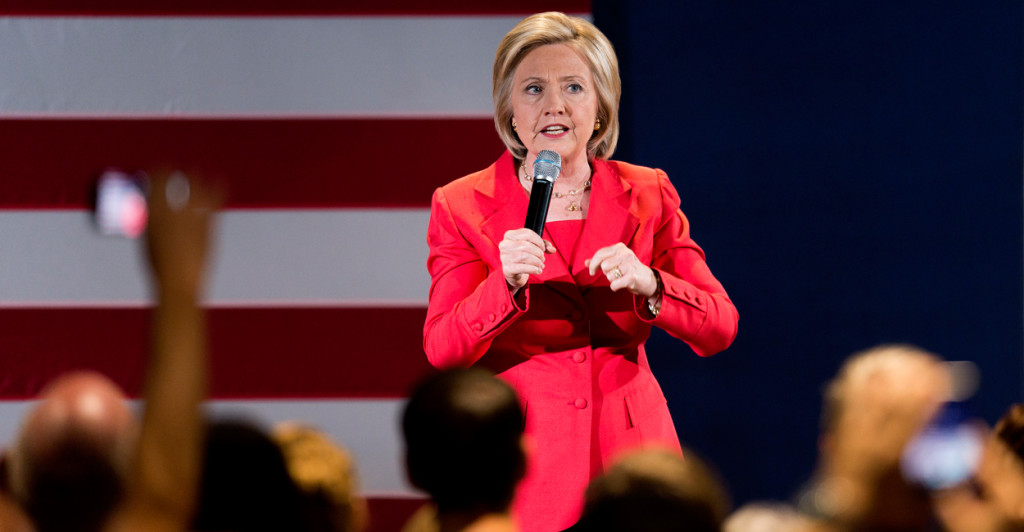
When Hillary Rodham Clinton takes the stage at fundraisers thrown by a group that wants to elect her president, she’s not presented as a White House candidate. She’s a “special guest.” When Jeb Bush raises money for a group preparing to run major parts of his all-but-certain presidential campaign, he doesn’t ask for the cash himself. And the hundreds of millions these groups will raise? They have to spend it without talking strategy with the candidates and campaigns they support. The groups are called super PACs, and their influence in selecting the next president will be without precedent. Born out of two Supreme Court decisions in 2010, they are governed by rules some see as a game of winks and nods, enforced by an agency bedeviled by partisan gridlock. As with most things in Washington, there’s not even agreement on whether they are a problem to solve, or are a solution to celebrate. “What’s really going on largely is a breakdown of the enforcement system of the campaign finance laws,” said Craig Holman of the left-leaning consumer group Public Citizen. “The Federal Election Commission is just broken.” Countered David Keating of the right-leaning Center for Competitive Politics, “I think this is overblown. The line has been drawn: It’s the First Amendment. So if people want to speak, let them.” The primary benefit for campaigns of the super PACs is that they can raise and spend unlimited amounts of money to advocate for and against candidates, with only a few rules holding them back. Among the rules is a ban on campaigns and super PACs working together. They cannot discuss political strategy or share key information such as internal polling. While candidates can attend super PAC events, they cannot technically ask for the unlimited donations that make the groups such a powerful force. “Most of these super PACs that are going to be spending millions of dollars, I think they have a good understanding of what the law is,” Keating said. But even should they break the rules, there are questions about what price they might pay. The six commissioners of the Federal Election Commission are split evenly between Republicans and Democrats, and they have only once cited someone for breaking the rules. In February, the campaign manager for a failed Virginia Republican congressional candidate pleaded guilty to funneling money illegally from a super PAC to bolster his campaign. Clinton has decried the existence of “unaccounted money” in politics and has suggested a constitutional amendment to overturn the case that helped usher in the new system. Yet during a California fundraising trip last week, she took her first steps to embrace Priorities USA Action, a Democratic super PAC that helped support President Barack Obama in 2012. Like other candidates, Clinton cannot legally ask donors to give more than $5,000 to the group. But she can appear as a “special guest.” Her husband, former President Bill Clinton, has headlined Priorities events in the past. On the Republican side, Bush is taking it even further. The former Florida governor is preparing to delegate many of the operations of his expected campaign to his allied Right to Rise super PAC, using the group to produce campaign ads, conduct voter data analysis and run get-out-the-vote efforts. Mike Murphy, one of Bush’s closest political advisers, is expected to lead the super PAC and is intimately involved in Bush’s current operation, where he guides staffing decisions, courts donors and shapes political strategy. Bush takes care to say he’s not yet a candidate, allowing him to work with Murphy and the super PAC in a way that won’t be allowed once he’s in the race. A dozen White House prospects are already benefiting from allied super PACs, frequently led by former political advisers and business partners. For example, Kentucky Sen. Rand Paul will benefit from a super PAC run by his former campaign manager, who is also married to Paul’s niece. Texas Sen. Ted Cruz‘s college roommate is working prominently in a network of four allied super PACs, while a longtime friend and financial backer, Dathan Voelter, is the treasurer. Voelter said the pro-Cruz groups have already raised more than $31 million. During his run for re-election in 2012, Obama never really warmed up to the super PAC world and the group supporting him, Priorities USA Action. He declined to appear at fundraising events even though his opponent, Republican Mitt Romney, frequently attended gatherings held by Restore Our Future, a pro-Romney super PAC. Seeking to succeed Obama in the White House, Clinton and her allies have taken steps recently to strengthen Priorities USA Action. Among them: She will appear at the group’s events and reach out to potential donors, something Obama declined to do. The group is also bringing aboard Guy Cecil, a former staff member of Clinton’s 2008 presidential campaign who remains close to Bill Clinton and previously worked for a firm stocked with longtime Clinton advisers. Republished with permission of The Associated Press.
Jeb Bush preparing to delegate many campaign tasks to super PAC
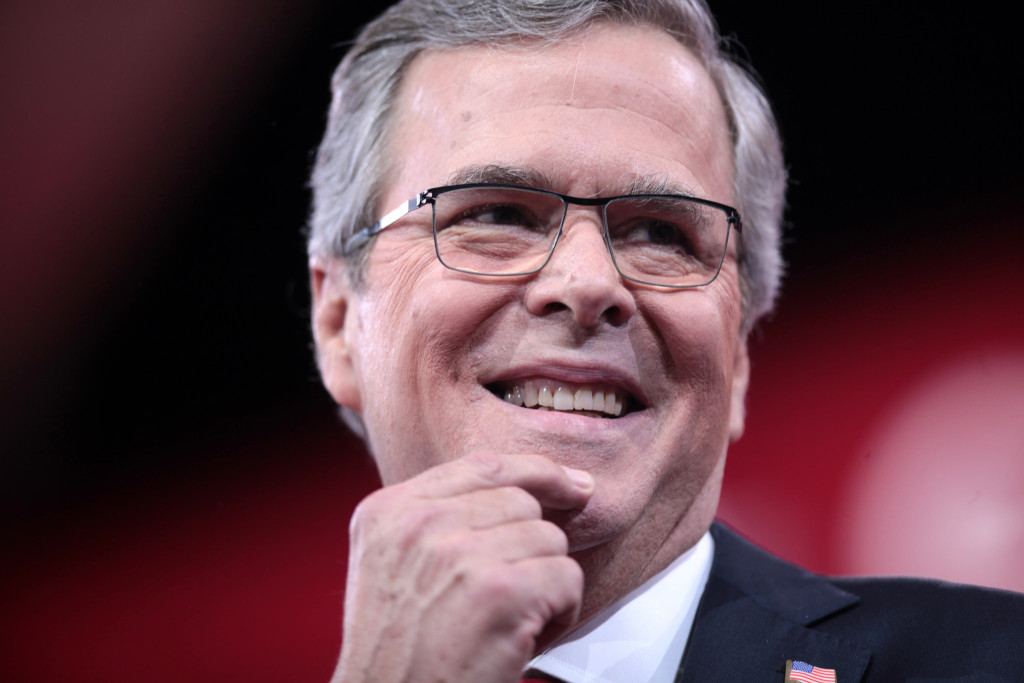
Jeb Bush is preparing to embark on an experiment in presidential politics: delegating many of the nuts-and-bolts tasks of seeking the White House to a separate political organization that can raise unlimited amounts of campaign cash. The concept, in development for months as the former Florida governor has raised tens of millions of dollars for his Right to Rise super PAC, would endow that organization not just with advertising on Bush’s behalf, but with many of the duties typically conducted by a campaign. Should Bush move ahead as his team intends, it is possible that for the first time a super PAC created to support a single candidate would spend more than the candidate’s campaign itself — at least through the primaries. Some of Bush’s donors believe that to be more than likely. The architects of the plan believe the super PAC’s ability to legally raise unlimited amounts of money outweighs its primary disadvantage, that it cannot legally coordinate its actions with Bush or his would-be campaign staff. “Nothing like this has been done before,” said David Keating, president of the Center for Competitive Politics, which opposes limits on campaign finance donations. “It will take a high level of discipline to do it.” The exact design of the strategy remains fluid as Bush approaches an announcement of his intention to run for the Republican nomination in 2016. But at its center is the idea of placing Right to Rise in charge of the brunt of the biggest expense of electing Bush: television advertising and direct mail. Right to Rise could also break into new areas for a candidate-specific super PAC, such as data gathering, highly individualized online advertising and running phone banks. Also on the table is tasking the super PAC with crucial campaign endgame strategies: the operation to get out the vote and efforts to maximize absentee and early voting on Bush’s behalf. The campaign itself would still handle those things that require Bush’s direct involvement, such as candidate travel. It also would still pay for advertising, conduct polling and collect voter data. But the goal is for the campaign to be a streamlined operation that frees Bush to spend less time than in past campaigns raising money, and as much time as possible meeting voters. Bush’s plans were described to The Associated Press by two Republicans and several Bush donors familiar with the plan, who spoke on condition of anonymity because the former Florida governor has not yet announced his candidacy. “This isn’t the product of some genius thinking,” said a Republican familiar with the strategy. “This is the natural progression of the rules as they are set out by the FEC.” Bush spokeswoman Kristy Campbell said: “Any speculation on how a potential campaign would be structured, if he were to move forward, is premature at this time.” The strategy aims to take maximum advantage of the new world of campaign finance created by a pair of 2010 Supreme Court decisions and counts on the Federal Election Commission to remain a passive regulator with little willingness to confront those pushing the envelope of the law. One reason Bush’s aides are comfortable with the strategy is because Mike Murphy, Bush’s longtime political confidant, would probably run the super PAC once Bush enters the race. Meanwhile, David Kochel, a former top adviser to Mitt Romney‘s campaigns and an ally of Bush senior adviser Sally Bradshaw, would probably be the pick to lead Bush’s official campaign. “Every campaign is going to carefully listen to the lawyers as to what is the best way to allocate their resources and how to maximize them,” said Al Cardenas, former chairman of the American Conservative Union and a Bush adviser. “Nobody wants to relinquish any advantage.” For Bush, the potential benefits are enormous. Campaigns can raise only $2,700 per donor for the primary and $2,700 for the general election. But super PACs are able to raise unlimited cash from individuals, corporations and groups such as labor unions. In theory, that means a small group of wealthy Bush supporters could pay for much of the work of electing him by writing massive checks to the super PAC. Bush would begin a White House bid with confidence that he will have the money behind him to make a deep run into the primaries, even if he should stumble early and spook small-dollar donors, starving his own campaign of the money it needs to carry on. Presidential candidates in recent elections have also spent several hours each day privately courting donors. This approach would not eliminate that burden for Bush, but would reduce it. “The idea of a super PAC doing more … means the candidate has to spend less time raising money and can spend more time campaigning,” said longtime Mitt Romney adviser Ron Kaufman, who supports Bush. The main limitation on super PACs is that they cannot coordinate their activities with a campaign. The risk for Bush is that his super PAC will not have access to the candidate and his senior strategists to make pivotal decisions about how to spend the massive amount of money it will take to win the Republican nomination and, if successful, secure the 270 electoral votes he will need to follow his father and brother into the White House. “The one thing you give away when you do that is control,” Kaufman said. Bush will also be dogged by advocates of campaign finance regulation. The Campaign Legal Center, which supports aggressive regulation of money and politics, has already complained to the FEC that Bush is currently flouting the law by raising money for his super PAC while acting like a candidate for president. Others are on guard, too. “In our view, we are headed for an epic national scandal,” said Fred Wertheimer, president of the pro-regulation group Democracy 21. “We intend to carefully and closely monitor all the candidates and their super PACs, because they will eventually provide numerous examples of violations.” All of the major candidates for president


